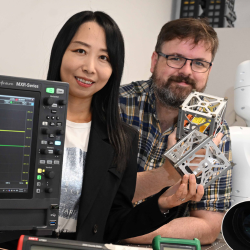-
Study
-
Undergraduate
- Search for a Course
- Undergraduate Open Day & Events
- Application Guides
- Northumbria University UCAS Exhibitions
- Foundation Years
- Undergraduate Fees & Funding
- School & College Outreach
- Continuing Professional Development
-
Postgraduate
- Postgraduate Study Degree
- Postgraduate Research Degrees
- Postgraduate Open Days and Events
- Postgraduate Fees & Funding
- Flexible Learning
- Thinking about a Masters?
- Continuing Professional Development
- Change Direction
-
Student Life
- The Hub - Student Blog
- Accommodation
- Life in Newcastle
- Support for Students
- Careers
- Information for Parents
- Students' Union
- Northumbria Sport
- Be Part of It
-
-
International
International
Northumbria’s global footprint touches every continent across the world, through our global partnerships across 17 institutions in 10 countries, to our 277,000 strong alumni community and 150 recruitment partners – we prepare our students for the challenges of tomorrow. Discover more about how to join Northumbria’s global family or our partnerships.
View our Global Footprint-
Applying to Northumbria
- European Union
- Our London Campus
- Northumbria Pathway
- International Events
- Entry Requirements and Country Representatives
- Regional Offices
-
Northumbria Language Centre
- Faculty Requirements
- Acceptable English Requirements
- Pre-sessional English Language and Study Skills
- Academic Language Skills Programmes (ALS)
-
International Fees, Funding & Scholarships
- International Undergraduate Fees
- International Undergraduate Funding
- International Masters Fees
- International Masters Funding
- International Postgraduate Research Fees
- International Postgraduate Research Funding
- International Money Matters
-
Life at Northumbria
- International student support
- Careers
-
International Mobility
- Current Northumbria Students
- Incoming Exchange Students
-
-
Business
Business
The world is changing faster than ever before. The future is there to be won by organisations who find ways to turn today's possibilities into tomorrows competitive edge. In a connected world, collaboration can be the key to success.
More on our Business Services -
Research
Research
Northumbria is a research-rich, business-focused, professional university with a global reputation for academic quality. We conduct ground-breaking research that is responsive to the science & technology, health & well being, economic and social and arts & cultural needs for the communities
Discover more about our Research -
About Us
-
About Northumbria
- Our Strategy
- Our Staff
- Place and Partnerships
- Student Profiles
- Alumni Profiles
- Leadership & Governance
- Academic Departments
- University Services
- History of Northumbria
- Contact us
- Online Shop
-
-
Alumni
Alumni
Northumbria University is renowned for the calibre of its business-ready graduates. Our alumni network has over 244,000 graduates based in 178 countries worldwide in a range of sectors, our alumni are making a real impact on the world.
Our Alumni - Work For Us
What will I learn on this module?
The first part of the module will encourage you to work on the type of responsible leader that you might become. This module will address an area of leadership development that is often minimized in dominant literature: the relationship between one's identity, social systems, power dynamics, and one's leadership identity. You will demonstrate the ability to work in diverse teams, reflecting on your ethical values and the impact of individual or organisational decision making on social and environmental contexts by exploring contemporary leadership theories. In this module, you will develop new knowledge and skills in leadership and followership and how to apply them to your organisation. You will be challenged to critically reflect and develop relational qualities that you think are necessary to build sustainable relationships and cope with the complex leadership challenges in a global, uncertain and interconnected environment.
The second part of the module is focused on developing your leadership competence and provide you with a toolbox for gaining insight into your strengths and weaknesses as a leader. This will equip you with critical thinking skills to successfully deal with complexity in a globalizing world through introducing you to relevant concepts for becoming a responsible leader. In this part, the focus will be on topics such as: Dilemma Thinking and Reconciliation as an approach to dealing with complexity and tensions between stakeholders in the global business environment; Mindful vs Mindless leadership, Emotional and Cultural Intelligence. You will also learn about the application of neuroscience to leadership development and HR management. Based on your understanding of how the brain works, you will create a series of personal challenges in which you aim to explore in-depth knowledge, cultivate and improve specific aspects of your competence (e.g. resilience, emotional labeling, stress management or trust building).
How will I learn on this module?
You will learn through interactive workshops, tutor guidance, feedback, and independent directed and self-directed learning.
Independent learning will centre upon you identifying and pursuing areas of interest in relation to the subject area or by providing deeper / broader knowledge and understanding of the subject through a range of learning activities that might include extended reading, reflection, research etc.
Directed learning will centre upon a range of activities including pre-reading and preparation for interactive activities.
We will make use of learning journals, group assignments and individual challenges to help you improve your leadership competence. Your learning is supported by a Teaching and Learning Plan, offering guidance on reading to prepare for lectures and seminars and help with the completion of the assessment. Within this plan there are also suggested learning activities, which guide you in your independent learning. These activities allow you to reflect and evaluate your knowledge and skills in this area.
A residential experiential learning event, based in the Netherlands will be a complementary support activity, providing you with opportunities to interact, through group-based activities, with peers on the programme. You will be supported in the analysis of individual and group processes and behaviours as a means of developing an understanding of self and others in relation to responsible leadership traits. You will be encouraged to provide each other with feedback in order to identify personal competence strengths and areas for development. Attendance and participation at this event directly links to the assessment. The residential event will be specific to students from the joint MSc programme thereby offering further opportunity to develop programme identify and recognise both academic and peer support available.
How will I be supported academically on this module?
The Teaching and Learning plan will provide several prompts and guidance to support you academically. Support will also include opportunities to gain feedback from workshop tutors and peers through the lectures and seminars.
Your module is supported by an e-learning portal, which houses all the module learning materials, workshop resources, interactive activities, assessment details and various other support facilities which are provided by the University.
In addition, in order to assist you in developing knowledge, you will have access to the University's library facilities, including extensive electronic resources, eBooks and electronic academic journal articles.
Formative feedback will be provided to you on a regular basis as the tutor, and your co-students, critically evaluate and provide recommendations for your development. Formative feedback helps you to reflect on your progress in the module as well as ensuring that you understand the assessment criteria and tutor expectations.
What will I be expected to read on this module?
All modules at Northumbria include a range of reading materials that students are expected to engage with. Online reading lists (provided after enrolment) give you access to your reading material for your modules. The Library works in partnership with your module tutors to ensure you have access to the material that you need.
What will I be expected to achieve?
N/A
How will I be assessed?
Summative Assessment:
Assessment A, consists of two parts (60%)
Part 1: Creating a Personal Leadership Portrait (20%).
As a leader, it is important for you to share information about yourself with your team. Communicating your philosophy on leadership, as well as your purpose, values, and expectations is a great way to build authentic relationships with your staff. In this exercise you will be required to create a Personal Leadership Portrait (PLP). (600 words)
Part 2: Own theoretical framework of leadership (40%).
Employing a critical analysis of leadership assumptions and theories, develop your own informal theory of leadership that addresses the current trends of society.
This assignment invites you to revisit the theories that we have discussed in this module and critically reflect upon and craft a theory that you can use to guide your practice of leadership. You will reflect on the various theories presented in this module and deconstruct how the theories align and are divergent with your personal narrative/story. (2000 words)
Assessment B - Group assignment: Leadership Dilemma (40%)
Group assignment: Leadership Dilemma
In this assignment, you will work with a group of 3-4 students to solve a real-life or fictional business and leadership dilemma. The teacher will provide you with a list of case studies, or you can decide to focus on a case study of your choice. (2500 words)
Pre-requisite(s)
N/A
Co-requisite(s)
N/A
Module abstract
This module departs from traditional leadership studies, in an attempt to develop a responsible leadership concept that considers social relations and ethical phenomenon, creating and sustaining a balance among all relevant stakeholders. The first part of the module will focus on the contemporary theories of leadership and how in an age of complexity, challenge and cynism, we could build a responsible leadership. This module will use both contemporary theory and examples to enable you to develop leadership that is shared, authentic and renewable within organisations and across networks. In doing so, the module will prepare you to be highly employable by developing key soft skills which have been identified by current research as those necessary for postgraduate students seeking work.
Course info
Credits 10
Level of Study Postgraduate
Mode of Study 18 months Full Time
Department Newcastle Business School
Start August 2026
All information is accurate at the time of sharing.
Full time Courses are primarily delivered via on-campus face to face learning but could include elements of online learning. Most courses run as planned and as promoted on our website and via our marketing materials, but if there are any substantial changes (as determined by the Competition and Markets Authority) to a course or there is the potential that course may be withdrawn, we will notify all affected applicants as soon as possible with advice and guidance regarding their options. It is also important to be aware that optional modules listed on course pages may be subject to change depending on uptake numbers each year.
Contact time is subject to increase or decrease in line with possible restrictions imposed by the government or the University in the interest of maintaining the health and safety and wellbeing of students, staff, and visitors if this is deemed necessary in future.
Useful Links
Find out about our distinctive approach at
www.northumbria.ac.uk/exp
Admissions Terms and Conditions
northumbria.ac.uk/terms
Fees and Funding
northumbria.ac.uk/fees
Admissions Policy
northumbria.ac.uk/adpolicy
Admissions Complaints Policy
northumbria.ac.uk/complaints














